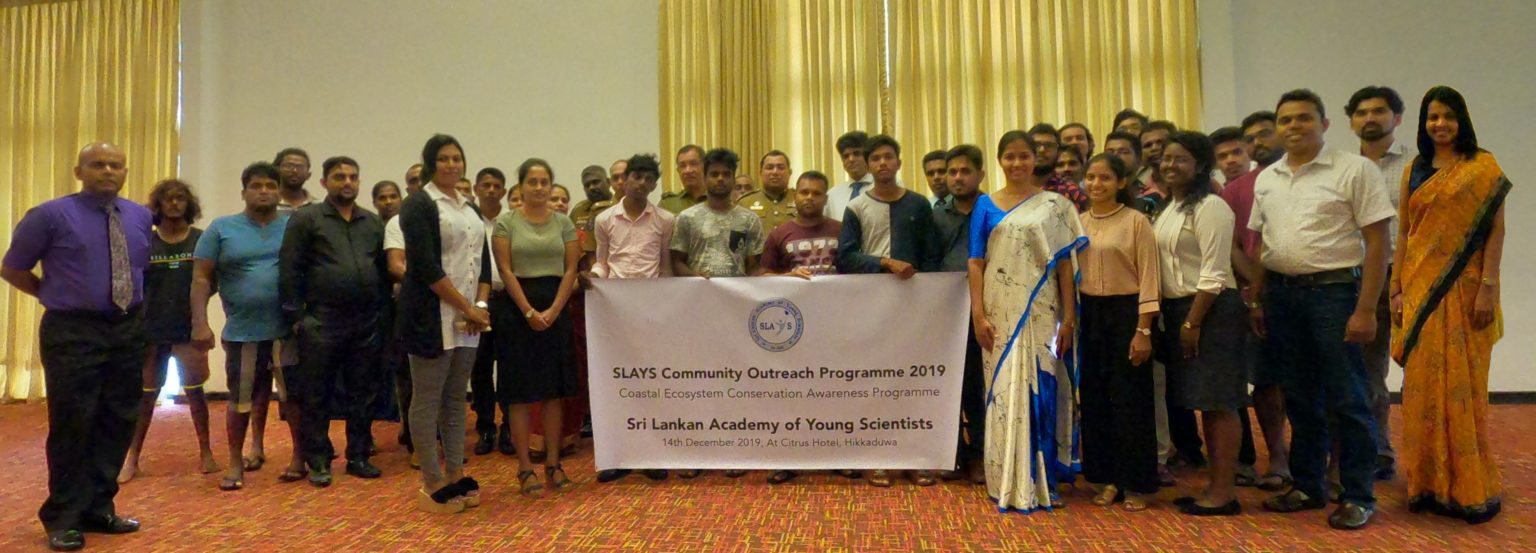The Sri Lankan Academy of Young Scientist (SLAYS) has conducted a community outreach programme on coast conservation.
The issue of marine habitat destruction and pollution is a serious threat to Sri Lankan coastal biodiversity. Being an inherent treasure trove of diverse coastal ecosystems, this issue has resulted in numerous problems, which have become so difficult to grasp in scale and sometimes engendering only a feeling of helplessness. The crisis has now reached an alarming level. Taking this topic to a greater audience, a ‘Coastal Ecosystem Conservation Awareness Programme’ was organized by the Sri Lankan Academy of Young Scientists (SLAYS) as one of their Community Outreach Programs for 2019. It was held on 14 December 2019 at Citrus Hikkaduwa Beach Hotel with the intention of strengthening the local knowledge base and advisory services among the key stakeholders of Hikkaduwa to raise awareness on Coastal Ecosystem conservation. The current SLAYS President, Dr Chamindri Witharana (Medical Faculty of University of Colombo) and her team took the challenge to make this a worthwhile event.
The event drew a wide range of participants representing different layers of the community to one arena. The officers-in-charge of the police station of Hikkaduwa, office-in-charge of the Tourist police station Hikkaduwa, environmental office-in-charge, police station Hikkaduwa, owners and workers of hotels and restaurants of the area, community leaders and local tourist guides were among them.
Prof Nalin Rathnayake, the Vice-Chancellor of Ocean University of Sri Lanka, Mrs K.A.W. Shymali Weerasekara, Sectional Head, Environmental Studies Division, the National Aquatic Resource Research and Development Agency (NARA) and Lieutenant Colonel Dr Wasantha Liyanage, Galle District Forest Officer, were the resource persons for the programme.
Prof Nalin Rathnayake emphasized on both applied and theoretical aspects of coastal environment in his lecture. He tried to give a thorough understanding of the physical and the human attributes related to coastal system covering various topics including the scientific factors of coastal system, wave dynamics, safeguarding measures at sea, marine resource management, coral replantation techniques, coastal pollution and mitigation of illegal activities conducted in relation to coastal environment. The facts discussed on coastal pollution and illegal activities related to shoreline were an eye-opener to this issue as it clearly showed the serious mishap it had brought upon Sri Lankan coastal ecosystem.
The lecture was followed by an exhaustive discussion and hard-hitting question-and-answer session with the participants. Several actions were pointed out in this discussion and they included better enforcement of existing legal frameworks, publicity through media and social platforms, formal programmes of awareness raising and education of the public at all levels. This requires concerted action by all those who care about the longer-term survival of coastal biota.
The event ended on a positive note with a lot being discussed on protecting these valuable integral parts of Sri Lanka. Providing a common platform, this wholesome experience created opportunities for the participants to gain new insights and create new knowledge on coastal ecosystem conservation while acquiring skills to contribute towards the safeguarding of the environment.
